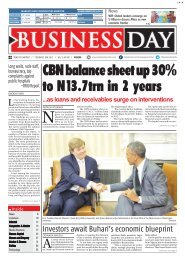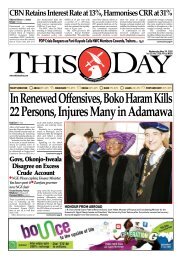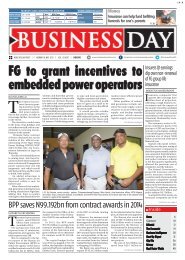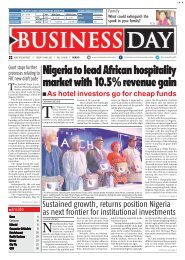Create successful ePaper yourself
Turn your PDF publications into a flip-book with our unique Google optimized e-Paper software.
30 THISDAY • WEDNESDAY, MAY 20, 2015<br />
BUSINESSWORLD<br />
INTERVIEW<br />
KHAN: NIGERIA’S FUEL SUBSIDY POLICY IS REGRESSIVE<br />
Your management is accused of unfair<br />
labour practices such as anti-women policy<br />
and the example of a pregnant woman who<br />
had to resume a day after child birth and<br />
then denying staff members their right to<br />
go on annual leave were cited.<br />
This is not true. NIMC Management is very<br />
labourfriendly. And I can give a few examples:<br />
We negotiated the redundancy package with<br />
the Unions in 2012, we signed an agreement<br />
with all the Unions including the ASCSN<br />
subsequently, we conducted the nationwide<br />
staff verification exercises with them each<br />
time we did it. We paid overtime, special<br />
allowances when we deployed the identity<br />
management infrastructure nationwide and<br />
we revived and provided support for the<br />
management of the staff transport scheme<br />
until they stopped running the scheme. We<br />
paid medical bills on compassionate grounds,<br />
we still run a clinic with medical doctors and<br />
sufficient drugs at the Head Office.<br />
The examples cited are a misrepresentation<br />
of facts to justify picketing NIMC by the<br />
ASCSN. Government’s employment policy<br />
is virtually the same in all MDAs and it<br />
does not discriminate against women. In the<br />
particular instant, honestly I think the Union<br />
is being unfair to Management and the lady<br />
in question. The truth is that she submitted<br />
a medical report during documentation, on<br />
resumption of duty that says she is not pregnant,<br />
But she was indeed pregnant. That is error<br />
number one. She could have been honest and<br />
Management would have said please go and<br />
have your baby and come back four months<br />
after to resume. There were such cases and<br />
we counselled them and they obeyed. To do<br />
otherwise would amount to being insensitive.<br />
Error number two is that she concealed the<br />
pregnancy for at least nine good monthsand<br />
she gave birth perhaps over the weekend and<br />
resumed the next working day. Now imagine<br />
how Management would have been vilified if<br />
anything had happened to her. So for obvious<br />
reasons we asked her to stop work, go and<br />
look after her baby and come back after four<br />
months. She did and we let her come back to<br />
work like other women who were pregnant<br />
on resumption and took our counsel, so that<br />
we all keep to the rules as best as possible. Is<br />
that anti-women policy? The same Union that<br />
applauded Management is now misrepresenting<br />
the facts to justify its action.<br />
About the annual leave issue. It is completely<br />
false. There were times when I directed that very<br />
senior people should not go on annual leave<br />
at particular times of the year. Whenever we<br />
were deploying or testing major components<br />
of the identity infrastructure I always made<br />
this clear, but not that they could not go on<br />
leave at all. However if you did not apply or<br />
were not entitled and or qualify for leave on<br />
compassionate grounds you should not go on<br />
leave. If you are being investigated it becomes<br />
very important that you should apply and<br />
obtain approval before you absent yourself<br />
from work.<br />
What of the accusation about not wanting<br />
to train and retain them?<br />
If the ASCSN is honest they will tell you<br />
we had done very well in that regard. Check<br />
the audited accounts and see how much we<br />
had spent on staff training local and abroad.<br />
Since 2008 we focused on sorting a few issues<br />
out that included retaining the trainable ones<br />
and equipping them well for the new system<br />
we have deployed. But there is something<br />
unusual in the defunct DNCR – they had the<br />
highest concentration of Executive Cadre staff<br />
in the entire public service and most people did<br />
not have the kind of qualification that fitted<br />
the restructuring and technology deployment<br />
we were doing. SAGEM of France excluded<br />
Nigerians in the core aspects of these deployment<br />
when the last ID Card Scheme was implemented.<br />
There was no sufficient requisite staff and we<br />
had to do a lot of rebuilding. We trained and<br />
absorbed those we could, provided they did<br />
not have any service records issues. Some<br />
of them were actually junior staff members<br />
inherited from DNCR. If I may ask, what do<br />
you do to a staff who did not attend any<br />
training because he or she was not around<br />
– was away in school and being paid, even<br />
went for NYSC elsewhere, got paid NYSC<br />
allowance and as a staff of DNCR/NIMC?<br />
I challenge the national ASCSN to ask each<br />
member of the local executive committee of<br />
Onyemenam<br />
the ASCSN NIMC Chapter to produce their<br />
staff service records to them for verification<br />
and make their findings public if they do not<br />
believe Management is sincere and honest.<br />
We know times are hard, we know some of<br />
them had put in years of service but do we<br />
abide in sin because grace abounds. What is<br />
the kind of institution we want to help build?<br />
I stand to be corrected, the Union has indeed<br />
been very unfair to NIMC Management, in<br />
particular the Governing Board, the Office<br />
of the Secretary to the Government of the<br />
Federation and the President, honestly.<br />
What we have focused<br />
on, and if you like<br />
call it a legacy is the<br />
establishment of a<br />
National Identification<br />
System that has come<br />
to stay. Now we have<br />
moved from there,<br />
to then institute a<br />
National electronic<br />
Identity Card that has<br />
also come to stay<br />
You were talking about some awards<br />
presented to NIMC in Dubai. Can you<br />
elaborate on that please?<br />
This happened on Tuesday the 12th of May,<br />
2015. There is this Smart Card and Payment<br />
Awards in the Middle East organised annually.<br />
It is a global event where developments in<br />
the smart cards and payment industry are<br />
assessed globally and institutions are encouraged<br />
to submit their products for assessment and<br />
evaluation. We were one of the five institutions<br />
that made the final list in our category ‘Best<br />
Payment Initiative Africa’ and NIMC clinched<br />
the award.<br />
The National e-ID Card was adjourned the<br />
most innovative African payment platform in<br />
2014. And for us, that is an important endorsement<br />
by the global community and as I speak,<br />
a couple of countries have indicated interest<br />
over the past six -seven months to come and<br />
understudy the Commission and see what we<br />
have done and how we did it. They include<br />
Ghana, UAE, Tanzania, Kenya, etc., so we are<br />
currently blazing the trail if you like in Africa<br />
and across the world. This is because it is<br />
not that the presence of a payment solution<br />
and an electronic identity on the same plastic<br />
have not been done before, what has not been<br />
done before is having more than just those<br />
two and having it at the level of a global<br />
name like MasterCard.<br />
Typically, what people do is to have an<br />
electronic identity and a local payment solution<br />
that is not deep enough and does not help<br />
in deepening financial inclusion or access to<br />
financial credits. But the partnership we have<br />
with MasterCard meant that our Card will be<br />
acceptable in over 210 countries and anywhere<br />
and amongst any of our banks and that is<br />
beautiful and that is what made the news<br />
around the world because we were able to<br />
make the criteria set by such a global brand<br />
as well as global standards for eID Cards.<br />
What we have focused on, and if you<br />
like call it a legacy is the establishment of a<br />
National Identification System that has come<br />
to stay. Now we have moved from there, to<br />
then institute a National electronic Identity<br />
Card that has also come to stay. Now we<br />
have moved to the level of implanting the<br />
identity verification scheme that is currently<br />
being used by one of the security agencies and<br />
as soon as we have the green light, it will be<br />
deployed in all of our airports and we will<br />
begin to see the value proposition in what we<br />
have done. So we have delivered. All that is<br />
left is the scaling up of the project and it was<br />
not originally the intention of government to<br />
handle the scaling up of the project? It was<br />
supposed to be handled by the private sector<br />
SPA s appointed as concessionaires.<br />
Finally DG, how would you like to be<br />
remembered, what legacies are you leaving<br />
behind in NIMC?<br />
By the time I leave hopefully at the end<br />
of my tenure in November 2015, the most<br />
important legacy and first thanks to God and<br />
second to Mr. President who made it possible<br />
for us to serve. Electronic identification scheme<br />
for Nigeria, we have also been able to set<br />
up a straight identity verification scheme for<br />
Nigeria. My team and i will be remembered<br />
for three thing; the winding up of the defunct<br />
DNCR has been completely achieved and there<br />
is no such thing as DNCR anymore, and if<br />
you investigate properly, you will find that<br />
there are institutions that have been wound<br />
up either by policy or laws still find a way of<br />
remaining around. That is not the case with the<br />
DNCR. Second, the three decade problem old<br />
of ascertaining or deciding on how to uniquely<br />
identify Nigerians has been laid to rest and<br />
that to me is an important legacy and I am<br />
sure that my team and I will be remembered<br />
for our pioneering efforts in ensuring that there<br />
is a departure from the past ways of doing<br />
identification in Nigeria. Like I very often say,<br />
we cannot solve our problems with the same<br />
thinking that we used when we created them,<br />
that was what i learnt from the legendary Albert<br />
Einstein. The thinking we had before led to<br />
an obsession with National institutions and<br />
the private sector, focusing on card issuance<br />
as an end to its self. Sometimes there cards<br />
can be duplicated or obtained from a business<br />
centre nearby. What we have now is a system<br />
that assures and uniquely says you are who<br />
you say you are and the Commission can<br />
confirm this conclusively. In our systems, this<br />
is represented by a set of 11 digits number<br />
that cannot be duplicated and is verifiable<br />
in a secure manner. And before the numbers<br />
are issued to anyone, care would have been<br />
taken to ensure through a specific process that<br />
is repeated for every such entry of personal<br />
information that your information had not<br />
been previously entered into the system, by<br />
the use of your biometrics (face, fingerprints<br />
and as we will soon upgrade to iris), because<br />
there is a National Identity Database (NIDB)<br />
where the data is stored. That is the beauty of<br />
what we have. And you know what what, it<br />
is secure, see with a disaster recivery/ business<br />
plan and Nigerians and local firms are<br />
significantly involved. Also, the National e-ID<br />
Card is the only government ICAO compliant<br />
token whose document signeris resident and<br />
managed in Nigeria.<br />
How useful will this legacy be to Nigeria<br />
and Nigerians?<br />
Positively. This is one legacy of President<br />
Jonathan’s administration that will be useful for<br />
the incoming administration. My understanding<br />
is that the incoming administration has security,<br />
unemployment and social welfare payments<br />
as very cardinal programmes to pursue and<br />
you must first be able to ascertain who each<br />
individual is before talking about eligibility<br />
for one social welfare programme or the other.<br />
Thats why the safety Nets Projects is already<br />
tied to this NIMS project. You must be able to<br />
talk of a foundation identity before talking of<br />
a functional identity. And so, it is very central<br />
or core to any attempt at addressing security<br />
social welfare issues particularly when you<br />
want to implement social welfare programmes<br />
like paying stipends to the unemployed or<br />
other deserving citizens, payment of benefits<br />
to farmers like we are currently working to<br />
deploy with the Federal ministry of Agriculture,<br />
payment of pensions to pensioners, payment<br />
of any other social benefit to citizens and<br />
for any other government transfers. So that<br />
process of providing unique identification for<br />
ensuring that such programmes get to the<br />
targeted population is already in place. This is<br />
an important programme for all times honestly<br />
and Nigerians should be appreciative of the<br />
effort of all NIMC staff.<br />
Secondly, a foundation identity provides you<br />
with the important tool not only facilitating<br />
service delivery across the public and private<br />
sectors abut also for fighting crime. It is going<br />
to complement the works of the security<br />
agencies. I alluded to the fact that access has<br />
been given to one of the agencies that is able<br />
to use the database to verify the identity of<br />
individuals and by the time we put it to use<br />
in some of the other government agencies<br />
and even in the private sector, the rate of<br />
identity related frauds will just take a dive<br />
downwards.<br />
Also unique identity means you can count<br />
the number of unemployed and channel them<br />
through a scheme using the card and luckily<br />
there is a payment solution on it. So it helps<br />
you to organise schemes around specific<br />
programmes based on eligibility indices, which<br />
is similar to what we are currently doing with<br />
the Ministry of Agriculture.
















